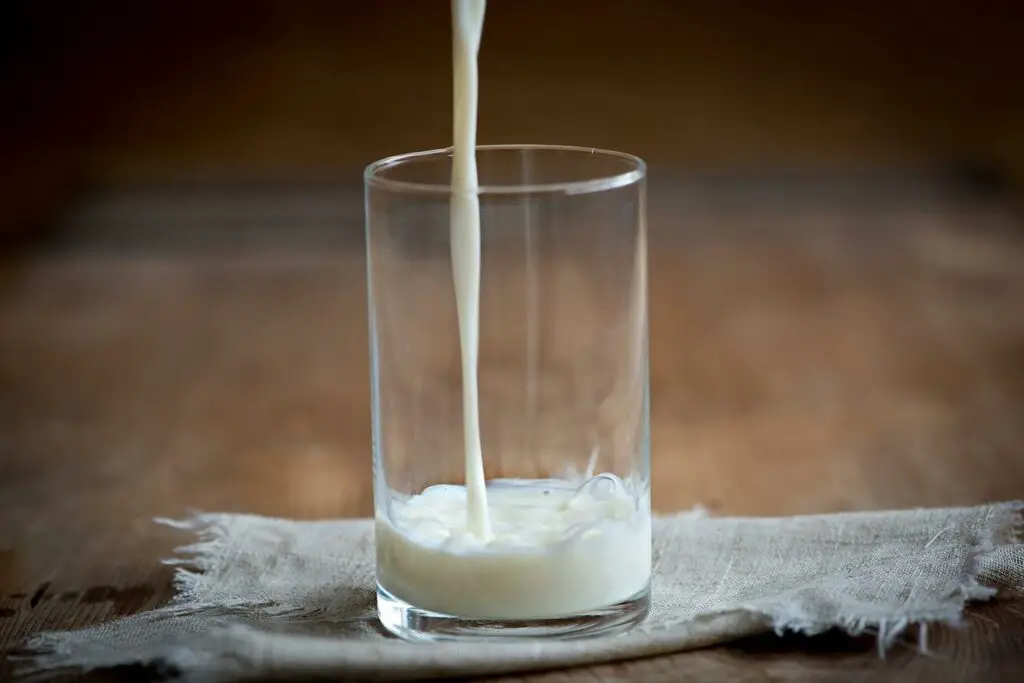Have you ever given your dog regular milk on those rare occasions when they seem to be in need of some extra hydration?
Maybe you were out of dog food and thought that since milk is okay for humans, it would be fine for dogs too.
Maybe you just wanted to give your pup a special treat, but is cow’s milk good for dogs?
Yes, cow milk is loaded with proteins, calcium, and vitamins beneficial for your pups.
Although not toxic, high sugars and artificial sweeteners in most flavored dairy products can be a health hazard to your canine friend in high quantities.
Be mindful when feeding cow milk if your furry pal is lactose intolerant or allergic to dairy.
The nutritional benefits of cow milk can tempt you to feed your pup daily.
But, this article guides you on the need for moderation.

Is cow milk good for dogs? Health benefits
Although milk is not recommended for canines in large quantities, it contains nutrients that benefit your pup in several ways.
However, it should only add to a balanced diet with meat, protein, veggies, and fruits.
Nutrients in cow milk include;
- Source of calcium – Your dog’s body requires calcium to build and maintain strong bones, teeth, and muscles. Calcium combined with Vitamin D helps prevent diabetes, high blood pressure, and some cancers in canines.
- Rich in proteins – Fluffs are playful and require more proteins to remain energized and develop strong muscles. Proteins also aid in cell growth, repair, and development.
- Low calories – Cow milk helps reduce cholesterol levels, thus weight management and reducing risks of high-fat-related diseases like obesity and pancreatitis.
- Source of vitamins – Cow milk contains vitamins A, D, and B12 that support good vision and strong bones and boosts immune functioning.

Is cow milk bad for dogs? Health risks
Anything good has downsides, and we highlight the harmful risks of feeding your pup cow milk.
Lactose intolerance
Milk contains a sugar called lactose that requires the enzyme lactase for digestion.
Infant pups produce enough lactase to break down lactose in their mother’s milk.
On the contrary, seniors dogs lack sufficient lactase and thus cannot digest the complex protein in cow milk.
This inability causes digestive irritation, commonly known as lactose intolerance.
Symptoms of lactose intolerance in canines include:
- Vomiting
- Diarrhea or loose stool
- Bloating or gassing
- Abdominal pain
- Thirsty
- Lethargy
- Poor appetite
Allergies
It’s easy to confuse lactose intolerance with dairy allergy in canines, which is the inability to tolerate proteins in milk and can be severe.
Allergic reactions in dogs can manifest as:
- Nausea
- Low appetite
- Excess itchiness and skin rashes
- Face swellings
- Hives
- Vomiting and diarrhea
- Excess paw and ear licking
Pasteurization
The milk production process, pasteurization, alters milk’s protein destroying its beneficial enzymes.
Pasteurizing under high temperatures to kill harmful bacteria, yeast, and molds and extend shelf life reduces the nutritional value of cow milk.
Critics also argue that recent cattle rearing activities like crowded conditions, inappropriate feeds, and antibiotic treatments affect the quality of cow milk.
Thus, most advocate for organic, small-scale farming to retain the natural proteins in cow milk.
What type of milk can dogs drink?
Several milk varieties are safe for dogs to consume; each comes with a different nutritional profile for a healthy pup.
You can easily get lost in the pool of milk information, but luckily we highlight which to feed your pup and those to avoid below;
- Cow milk: This is the most common in human consumption for its high-quality protein, calcium, and micronutrients. However, its potency in lactose makes cow milk problematic to dogs in high amounts.
- Goat’s milk: It’s a rich source of protein, potassium, vitamin C, and fat. Sources indicate this is a better choice for canines with less lactose than cow milk, making it easier for dogs to digest. However, moderation is still important.
- Almond milk: This is non-dairy milk made of almonds and water—rich in vitamin E, dietary fiber, and magnesium. Almond milk doesn’t contain lactose, thus safer for lactose intolerant canines. Be wary of some store-bought almond milk that contains artificial sweeteners like chocolate and xylitol lethal to your furry friend.
- Soy milk: Soy is present in most dog foods, thus safe for canines to drink moderately. It’s a rich source of plant-based protein and antioxidants. Unfortunately, it’s a top allergen in dogs and manifests in signs like vomiting, excess licking, and ear infections.
- Coconut milk: One downside of coconut milk is the high-fat content which might cause weight gain and pancreatitis in large consumption. Otherwise, it’s a great immune booster promoting a healthier coat and fresh breath.
Can dogs eat cow milk products?
Dogs can eat cow milk products. Dairy products are safe for dogs, provided they are not lactose intolerant or allergic to the protein in milk.
The bottom line
Dogs can safely drink cow milk, provided they are not lactose intolerant or allergic.
Don’t let the nutritional profile trick you into feeding cow milk excessively; moderation is key.
Opt for safer options like almond milk if your pup is lactose intolerant.
Alternatively, other dairy products like ice cream and cheese are better options as special treats.
- What Dog Breeds Have Pink Skin? - March 24, 2023
- What Are the Most Inspiring Dog Breeding Quotes? - March 20, 2023
- Can Pheromone Spray Help Improve Dog Breeding Results? - March 19, 2023








